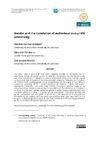Identificador persistente para citar o vincular este elemento:
https://accedacris.ulpgc.es/jspui/handle/10553/70350
| Campo DC | Valor | idioma |
|---|---|---|
| dc.contributor.author | Corrius Gimbert, Montse | en_US |
| dc.contributor.author | De Marco, Marcella | en_US |
| dc.contributor.author | Espasa Borrás Eva | en_US |
| dc.date.accessioned | 2020-02-19T08:13:12Z | - |
| dc.date.available | 2020-02-19T08:13:12Z | - |
| dc.date.issued | 2016 | en_US |
| dc.identifier.issn | 1133-1127 | en_US |
| dc.identifier.uri | https://accedacris.ulpgc.es/handle/10553/70350 | - |
| dc.description.abstract | This paper aims to explore to what extent students enrolled on Translation and on Advertising courses are gender aware, i.e. whether they perceive that the decisions they take when translating or creating non-profit advertisements which present gender-related concerns may have an impact on the social perception of gender. Three groups of students of different levels (undergraduate versus postgraduate) and belonging to two different universities (University of Vic – Central University of Catalonia – Spain, and London Metropolitan University – UK) come under scrutiny. Drawing on previous stages of the study, the authors intend to examine how it is possible to address ethical issues in students’ curricula, to what extent gender awareness guides students choices when they work with non-profit adverts as opposed to commercial ones, and whether professional priorities and gender perspectives are compatible. A set of non-profit advertisements analysed and translated by the students and two Likert-type questionnaires have been used for this purpose. In addressing these questions, this study intends to fill the existing gap between gender, translation and advertising-focused research. | en_US |
| dc.description.abstract | Este artículo se propone explorar hasta qué punto el alumnado universitario de traducción e interpretación muestra conciencia de género, es decir, percibe que las decisiones tomadas al traducir o crear anuncios solidarios en los que se abordan cuestiones de género puede tener impacto en la percepción social sobre el género. Se estudian tres grupos de estudiantes de distintos niveles (grado y posgrado) y de dos universidades distintas (Universidad de Vic – Universidad Central de Catalunya y London Metropolitan University). Partiendo de las fases previas de un estudio más amplio, las autoras se proponen examinar cómo es posible tratar cuestiones éticas en el currículo del alumnado; hasta qué punto la conciencia de género guía las elecciones del alumnado cuando trabaja con anuncios solidarios en contraste con publicidad comercial, y si las prioridades profesionales y las perspectivas de género son compatibles. Para este propósito, se usó un conjunto de anuncios solidarios, que fueron traducidos y analizados por el alumnado, y dos cuestionarios de escala tipo Likert. Al abordar estas cuestiones, este estudio intenta explorar los vacíos existentes entre las investigaciones sobre género, traducción y publicidad. | en_US |
| dc.language | eng | en_US |
| dc.relation.ispartof | LFE. Revista de Lenguas para Fines Específicos | en_US |
| dc.source | LFE. Revista de lenguas para fines específicos [eISSN 2340-8561], v. 22 (2), p. 31-61 | en_US |
| dc.subject | 570107 Lengua y literatura | en_US |
| dc.subject | 550510 Filología | en_US |
| dc.subject.other | Audiovisual translation | en_US |
| dc.subject.other | Advertising | en_US |
| dc.subject.other | Non-profit advertising | en_US |
| dc.subject.other | Gender awareness | en_US |
| dc.subject.other | Traducción audiovisual | en_US |
| dc.subject.other | Publicidad | en_US |
| dc.subject.other | Anuncios solidarios | en_US |
| dc.subject.other | Conciencia de género | en_US |
| dc.title | Gender and the translation of audiovisual non-profit advertising | en_US |
| dc.type | info:eu-repo/semantics/article | en_US |
| dc.type | Article | en_US |
| dc.identifier.doi | 10.20420/rlfe.2016.111 | en_US |
| dc.investigacion | Artes y Humanidades | en_US |
| dc.type2 | Artículo | en_US |
| dc.identifier.ulpgc | Sí | es |
| dc.description.esci | ESCI | |
| dc.description.dialnetimpact | 0,0 | |
| dc.description.dialnetq | Q1 | |
| dc.description.dialnetd | D3 | |
| dc.description.erihplus | ERIH PLUS | |
| item.grantfulltext | open | - |
| item.fulltext | Con texto completo | - |
| Colección: | Artículos | |
Citas de WEB OF SCIENCETM
Citations
5
actualizado el 15-feb-2026
Visitas 10
405
actualizado el 15-ene-2026
Descargas
257
actualizado el 15-ene-2026
Google ScholarTM
Verifica
Altmetric
Comparte
Exporta metadatos
Los elementos en ULPGC accedaCRIS están protegidos por derechos de autor con todos los derechos reservados, a menos que se indique lo contrario.
